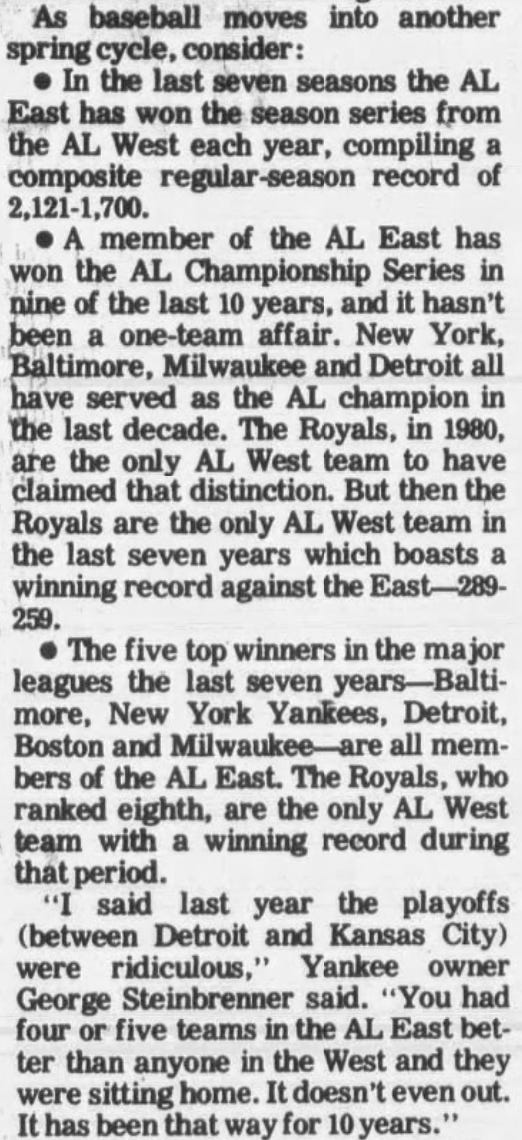The East-West Imbalance
I came across this old article the other day:
Not only is this a fascinating piece of sportswriting that we just don’t see in local newspapers today, but it’s also a pretty interesting bit of baseball analysis:
George, of course, didn’t have much of a crystal ball. Look at which teams won the American League pennant between when he made this statement and the end of the four division era in 1994:
1985: Kansas City Royals (West)
1986: Boston Red Sox (East)
1987: Minnesota Twins (West)
1988: Oakland Athletics (West)
1989: Oakland Athletics (West)
1990: Oakland Athletics (West)
1991: Minnesota Twins (West)
1992: Toronto Blue Jays (East)
1993: Toronto Blue Jays (East)
That would be 6 West winners in 9 seasons — and the Angels came really close to winning in 1986, of course.
And so you’ve got to take statements like this one with a grain of salt:
It just might be the case that the “name players” were actually poor investments — something that Steinbrenner should have figured out.
Now, I should be careful before I get too excited about proving this article wrong. After all, 2 of the 6 winning teams above were considered among the weakest pennant winners of all time. The 1987 Minnesota Twins are notorious for being a weak pennant winning (and World Series winning) club, and the 1985 Kansas City Royals were criticized at the time for not being a particularly strong team.
And that brings up the big question. Was there really an imbalance here — or was this just an illusion caused by misunderstanding the way that free agency really worked?
The powerhouse Athletics, of course, were largely built around homegrown young players: Jose Canseco, Mark McGwire, Walt Weiss, and so on. Even the likes of Dennis Eckersley, Mike Moore, and Dave Stewart weren’t really “type-A free agents” or first class players until they got to Oakland.
Anyway, that’s my take on this. What do you think?







The balance of power between AL East and AL West shifted starting in 88 with the rise of the A's juggernaut. That said the situation that existed in the 80s revealed the reason why wildcards were needed. The 84 Royals got to postseason with a record that would have been fifth best in the AL East. And the 87 Twins took a World Championship with a record that would have been fifth in the AL East as well.
The Don Mattingly Yankees would have made the postseason multiple times had the wildcard existed in the 1980s and IMO that could have had a bearing on Mattingly's chances for making the Hall of Fame. Kirby Puckett had identical career numbers to Mattingly and got in on the first ballot and IMO his playing on two championship teams was a big influence there.
Making the issue worse is that from 1979 through 1993 the AL played a balanced schedule so the divisions were just there for decoration. It's not as if the Royals had a better record because the AL West was better from top to bottom; they were just lousy compared to the AL East in 1984, but because of geography, they got to play the Tigers in the ALCS